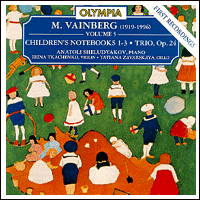
VAINBERG
Piano Trio, Opus 24 (1945)
*Children's Notebooks I-III (19?)
Irina
Tkachenko (violin); Tatiana Zavarskaya (cello)
*Anatoli Sheludyakov
(piano)
Olympia OCD 581 [69:36/DDD]

VAINBERG
Piano Trio, Opus 24 (1945)
*Children's Notebooks I-III (19?)
Irina
Tkachenko (violin); Tatiana Zavarskaya (cello)
*Anatoli Sheludyakov
(piano)
Olympia OCD 581 [69:36/DDD]
Olympia's Vainberg series reaches Volume 5 and the fascination of this composer continues to grow. As with the earlier Olympia issues, not to mention Russian Disc's Vainberg discs, there is a close relationship with the work of the composer's mentor and friend Shostakovich; and, as before, the influence runs back and forth between them. For example, the opening Prelude and Aria of Vainberg's Piano Trio draws on the Prelude of Shostakovich's Piano Quintet of 1940, while at the same time offering a model for the first movement of Shostakovich's Fourth String Quartet (1949). Elsewhere, especially in the piano pieces of the Children's Notebooks, Vainberg takes as much from Prokofiev as from Shostakovich, yet the music is always totally - and often fiercely - his own.
Speaking of ferocity, the Piano Trio presents Vainberg at his most intense. A Polish Jew, he lost most of his family to the Nazis, burned alive during the onslaught on Warsaw in 1939. Composing the Trio in 1945, he would surely have been dwelling on the newly-discovered SS death camps in his homeland, not to mention the equally recent Nazi repression of the Warsaw Uprising (condoned by the Red Army). Compared to his richly-textured Piano Quintet of 1944 (Olympia OCD 474), the Piano Trio is stark, angular, and dissonant to the point of intermittent atonality. It is as if the flesh of this music has been scalded off its bones by a searing fusion of anger and anguish. Shadowing the "Jewish" finale of Shostakovich's Second Piano Trio in its last movement, Vainberg's Piano Trio nevertheless holds its own by virtue of its intensity, intelligence, and constant invention. Suffice it to say that this performance (made in Moscow a little under six months ago) attains the extremeties of feeling latent in this score, which is all one could ask for from a première recording.
In the Children's Notebooks, Anatoli Sheludyakov is too closely recorded to avoid pedal noise in the quieter pieces, but his interpretation is both secure and true to a range of imagery and emotion which would baffle, even frighten, all but the most thoughtful of children. Though sometimes simple enough to be played by beginners, these twenty-three short compositions are actually somewhere between musical parables for open young ears and stylistic studies in childlike directness in the face of intense experience. Thus, as well as expressions of innocence, we find here love lyrics, violent dances, and two death pieces of a skeletal eloquence which recall the saturnine moods of Alkan's shorter pieces. Not, perhaps, a first choice for anyone setting out to explore Vainberg, this disc will be gratefully snapped up by those who have already decided that they need to find out everything they can about this shamefully neglected composer.